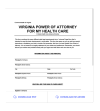- Jurisdiction
- Virginia
My husband has a learning disability. He is out of work due to surgery related to his disability. He has always had issues recalling information and I have always been the person to help him. He needed to withdrawal funds from his 401k due to hardship because he is unable to get full pay while on leave. He called to initiate hardship withdrawal and the rep asked his for his employee ID, my husband has been at his job 17 years and still doesn't know this number and I helped him recall the number and they said that they will not allow him to withdraw any funds from his account because I helped him. I informed them that we have submitted the form to his company already but they say that they hadn't seen it yet. They said because he has had surgery and needed help, they will only share with my husband balance info but not allow him to remove funds until his POA form is received. I am the person that will be identified as his POA.
The company has NOT received the POA yet, they will not allow him access to his funds. My husband provided the answers to all of the questions to confirm his identify. They had us record our voices for the records. I explained that my husband has a disability and has always had issues recalling information.
I feel like they have discriminated against my husband based on his disability and identifying as such. They took the information that we provided and used it against us. They won't allow any changes yet they accepted that he has a POA without the forms. It doesn't make any sense. My husband does not have a large amount of funds in his account. I do recognize that people scam elders and people with disabilities but we explained all of the details and they did not accept this. He has even been locked out of his retirement account.
The POA form was submitted but they haven't received and said that it may take 12-14 days. Any help or guidance is appreciated.
The company has NOT received the POA yet, they will not allow him access to his funds. My husband provided the answers to all of the questions to confirm his identify. They had us record our voices for the records. I explained that my husband has a disability and has always had issues recalling information.
I feel like they have discriminated against my husband based on his disability and identifying as such. They took the information that we provided and used it against us. They won't allow any changes yet they accepted that he has a POA without the forms. It doesn't make any sense. My husband does not have a large amount of funds in his account. I do recognize that people scam elders and people with disabilities but we explained all of the details and they did not accept this. He has even been locked out of his retirement account.
The POA form was submitted but they haven't received and said that it may take 12-14 days. Any help or guidance is appreciated.

